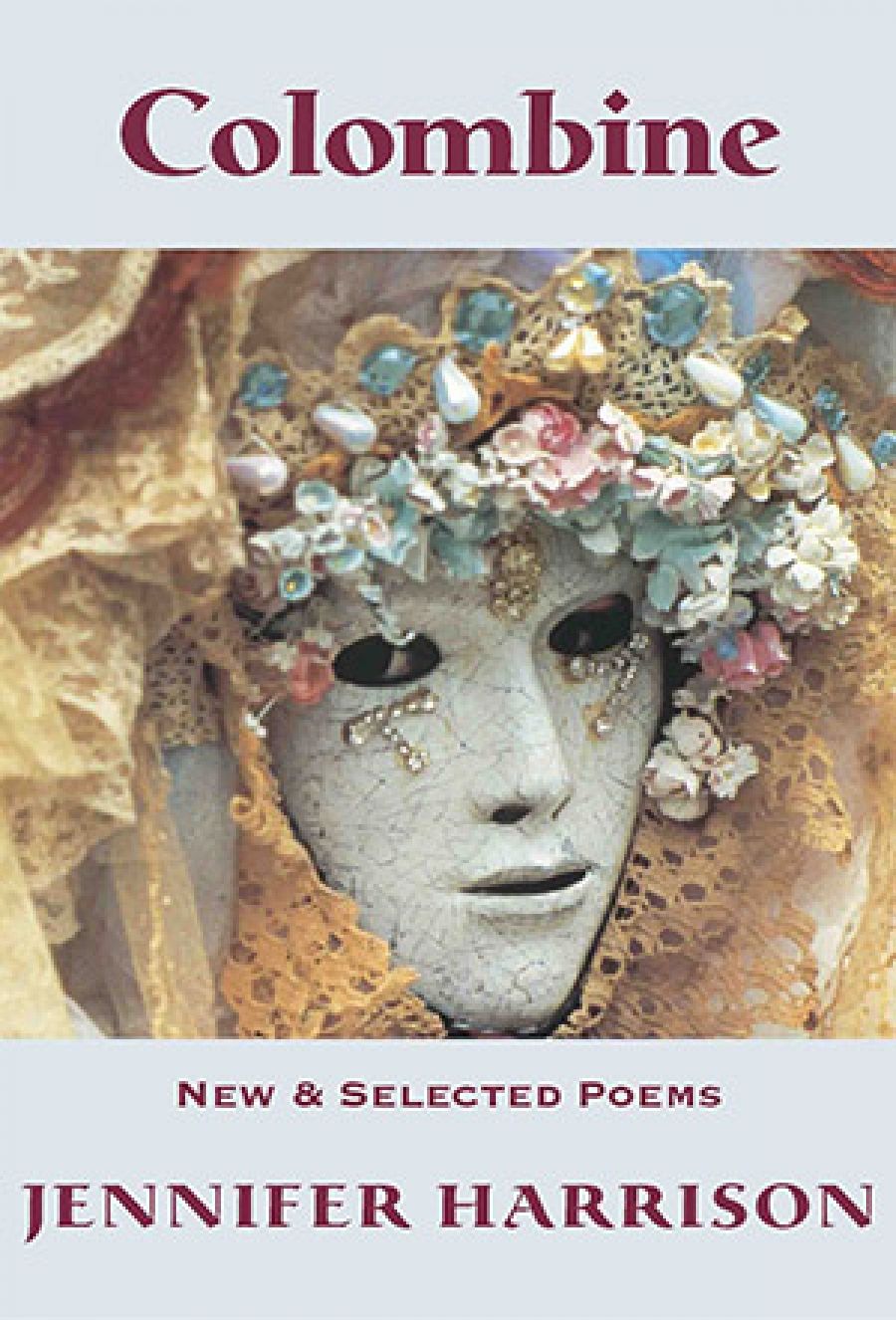
- Free Article: No
- Contents Category: Poetry
- Custom Article Title: Martin Duwell reviews 'Colombine: New & Selected Poems' by Jennifer Harrison
- Review Article: Yes
- Online Only: No
- Custom Highlight Text:
Colombine selects from Jennifer Harrison’s four previous collections and adds a book-length group of new poems. In keeping with current practice, the new poems precede the selections, so that anyone wanting to consider Harrison’s twenty-year poetic career in terms of development has to begin ...
- Book 1 Title: Colombine
- Book 1 Subtitle: New and selected poems
- Book 1 Biblio: Black Pepper, $28.95 pb, 247 pp,
Cabramatta/Cudmirrah (1996), her second book, is a kind of double journey into memory, focusing on grandparents. The opening section is a tribute to the western suburbs of Sydney, written slightly in the tough talk of that area; the second section is about her childhood holidays on the south coast of New South Wales. However, the issue of memory is not quite as simple as it usually is in poems where childhood sites are revisited. Her grandmother, we learn (less equivocally in the book than in the selection made in Colombine) is an Alzheimer’s disease victim, and the later poems are partly imagined to be conversations between grandmother and granddaughter, trying to prevent the past disappearing. Memory, the grandmother is imagined to say, ‘digs less for an accurate world / than for the fetch of the wave / and the tide which calls my name / most faintly inwards’.
Though Harrison’s next book, Dear B (1999), has rather the quality of a time-marking third book (and is selected from sparingly in Colombine), her fourth book, Folly & Grief (2006), contains her best work so far and deserves to be celebrated as one of the books of the decade. The overriding symbol is of performance, and the poems show an intense interest in commedia dell’arte figures such as Colombine and Harlequin, in buskers, ventriloquists, and sideshows. Often the result of building a collection around a constellation of images like this is a certain attenuated quality, but Folly & Grief is marked by an extraordinary richness of invention and poetic performance.
The new poems are divided (like all of Harrison’s books, except for Dear B) into two sections. The first contains many poems of travel, which again are far more ambitious and accomplished than the fairly tame poetic genre in which they have their origins: ‘In landscapes I think myself improvisatory,’ she says, gnomically, in ‘Uluru’. And the second section is a kind of biography of Colombine or, at least, the biography of someone who might be one of her incarnations: ‘An actress, I study the faces of birds and believe in science.’ Good as these new poems are – ‘Swann’s Way’ is a brilliant poem about love and life in the past contrasted to the present – it is hard not to think of them as being a kind of afterglow of Folly & Grief.
Colombine shows that its author is a copious, varied, sophisticated, and complex poet. When you first read Harrison’s early work, you are likely to be taken by the continuous presence of the sea and, in her later work, by the continuous presence of performance. As will be seen from the brief descriptions of the books which I have given, I think she is better seen as a poet of journeys, memories, and masks.
She is also a poet of pairs, sometimes the pairing of face and mirror-image, or of face and mask. If one wanted to provide an example of a moment when her poetry is at its most distinctively personal, it might be a small passage in the first part of Cabramatta/Cudmirrah, in which she speaks of the outskirts of Sydney which have, over the years since her own childhood, grown up around the highway as ‘dicotyledon suburbs / flowering into tidiness’. It is not only that the metaphor betrays her background in the sciences (this passage is considerably simplified from its initial appearance in Cabramatta/Cudmirrah, and one of the ways of looking at Harrison’s development would be to note the gradual disappearance of the technical vocabulary that is common in Michelangelo’s Prisoners), but you feel that the mirror-image of the doubling of the suburbs is what provokes the poetic response here.
The interest in mirrors (as an example of pairing) produces two of the best poems in Folly & Grief. ‘Baldanders’ (the title, German for ‘soon something else’, derives from Borges) is a complex, three-part poem made up of encounters with a kind of mirror-man; ‘The Fauna of Mirrors’ uses the idea of an eighteenth-century French priest’s catalogue of the beings that inhabit mirrors as the basis for what is, essentially, a personal poem.
Poet of memory or poet of pairs, Harrison is a challenging and significant poet, the quality of whose work needs defining and celebrating. A handsome, mid-career, selection of poems like Colombine might just get that process started.


Comments powered by CComment